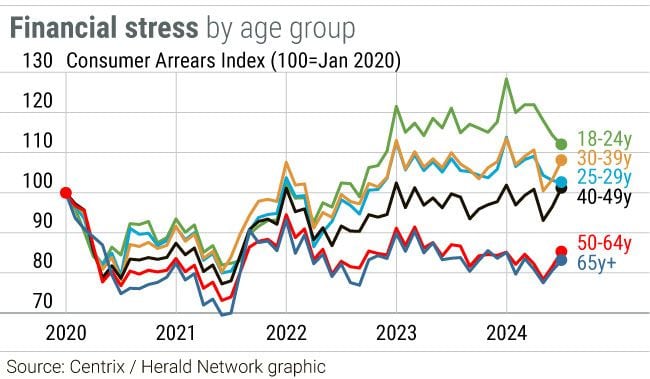
Financial stress appears to be easing for younger Kiwis but it’s a different picture for those with mortgage commitments, new data shows.
Figures from credit bureau Centrix show financial stress levels for those between 30-49 years old have been climbing since May.
Meanwhile, under 30s, among those hit hardest by the cost of living crisis, have experienced a decrease in financial stress over that time, albeit coming down from a higher marker.
According to Centrix’s August Credit Indicator report, financial stress as measured by consumer arrears among the 30-39 age group rose from 100.5 points in May to 107.9 in July. The index uses a baseline of 100 as of January 2020.
For those between 40-49 years old, financial stress levels climbed to 101.3 in July, up from 93.1 in May.

But in the 18-24 age group, financial stress levels have fallen over the past two months, down from 118 in May to 111.9 in July.
This is also the case for those between 25-29 years of age, where financial stress levels fell from 104.3 in May to 102.4 in July.
“Markers of financial stress, namely consumer arrears, have improved for those under 30, but they remain for middle-aged consumers carrying home loans,” Centrix managing director Keith McLaughlin said.
“Consumers under 30 were among those hit hardest by the cost of living crisis, being more likely to experience cash flow problems with little savings to rely on. However, they have fared better in recent months as inflation has eased.
“There are signs that consumers aged 30-49 are still experiencing debt stress, with many having home loan commitments. While consumers aged 50 or more are faring better with lower levels of arrears than pre-pandemic.”
Financial hardship cases rose by 350 in July to 13,850. The number of financial hardship accounts are up by 26.6% year on year, according to Centrix.
Of the 13,850, 46% relate to mortgage payment difficulties, followed by credit card debt (29%) and personal loan repayments (17%).
Meanwhile, overall consumer arrears continued to ease in July, with the number of people behind on their payments falling to 456,000, down 9000 month on month.
“Buy now, pay later” arrears dropped to 7.6% in July, the lowest level since October 2023. Personal loan arrears rose slightly to 9.1% in July compared to 9.0% in June.
Mortgage arrears also improved slightly in July, with 21,000 home loans reported as past due, down 500 from June.
“However, this is still up 12% year on year, while mortgage demand also remains subdued overall with application enquiries down 1.5% year on year,” McLaughlin said.
Figures from the Reserve Bank show the percentage of non-performing loans in July was 0.7% - the fifth consecutive month without movement.
“Since [the Reserve Bank cut the official cash rate], we’ve seen banks around the country reacting by cutting interest rates, which could be the beginning of a welcome reprieve in household expenses for mortgage holders,” McLaughlin said.
Cameron Smith is an Auckland-based journalist with the Herald business team. He joined the Herald in 2015 and has covered business and sports. He reports on topics including retail, small business, the workplace and macroeconomics.
Take your Radio, Podcasts and Music with you









